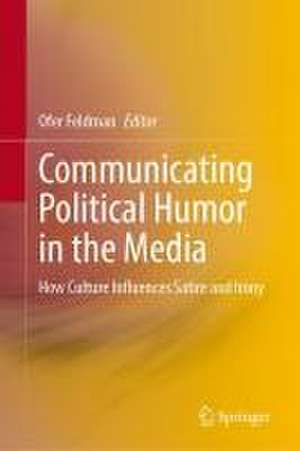Communicating Political Humor in the Media: How Culture Influences Satire and Irony: The Language of Politics
Editat de Ofer Feldmanen Limba Engleză Hardback – 8 mai 2024
Preț: 951.91 lei
Preț vechi: 1160.86 lei
-18% Nou
Puncte Express: 1428
Preț estimativ în valută:
182.15€ • 189.80$ • 150.82£
182.15€ • 189.80$ • 150.82£
Carte tipărită la comandă
Livrare economică 03-17 aprilie
Preluare comenzi: 021 569.72.76
Specificații
ISBN-13: 9789819707256
ISBN-10: 9819707250
Ilustrații: XII, 309 p. 74 illus., 46 illus. in color.
Dimensiuni: 155 x 235 mm
Greutate: 0.63 kg
Ediția:2024
Editura: Springer Nature Singapore
Colecția Springer
Seria The Language of Politics
Locul publicării:Singapore, Singapore
ISBN-10: 9819707250
Ilustrații: XII, 309 p. 74 illus., 46 illus. in color.
Dimensiuni: 155 x 235 mm
Greutate: 0.63 kg
Ediția:2024
Editura: Springer Nature Singapore
Colecția Springer
Seria The Language of Politics
Locul publicării:Singapore, Singapore
Cuprins
Chapter 1: Humor and Politics in the Media: A Conceptual Introduction.- Part I: Humor in Political Cartoons.- Chapter 2: The Relationship between Culture and Political Humor in Japanese Manga.- Chapter 3: A Tale of Two Presidents: Indonesian Humor As Depicted in Political Cartoons.- Chapter 4: Mocking the Inept: Brazilian Cartoons and Criticism of the Jair Bolsonaro Government.- Chapter 5: How Political Cartoons Reveal Türkiye’s Cultural Dynamics: An Analysis of Three Satirical Magazines.- Chapter 6: Spanish Humor and Political Culture through Cartoons: Multimodal Discursive Analysis of Forges’s Socio-Political, Graphic Universe.- Chapter 7: Far-Right Political Humor in Australia: Culture, Coloniality, and Exclusion.- Part II: Political Humor in the Broadcast Media.- Chapter 8: Televised Political Satire in Poland: Historical Roots and Social Implications of Stereotypical Representations of Politicians and Politics.- Chapter 9: Sexist Humor in Public Facebook Comments Delegitimizing Female Politicians within Montenegro’s Patriarchal Culture.- Chapter 10: Exploring Attitudinal Meaning in Iranian Political Humor Targets as Distributed through Social Networks.- Chapter 11: Mocking the Powers That Be: The Case of Culture and Political Humor in Malaysia.- Part III: Political Humor in the Print Media.- Chapter 12: Politically Related Senryû Verses in Daily Newspapers as a Manifestation of Humor in Japan.- Chapter 13: Depicting “La Grieta”: The Role of Political Satire and Humor in Argentinean Polarization.- Part IV: Conclusion.- Chapter 14: The Complexity of Media Political Humor: Research Considerations.- Index.
Notă biografică
Ofer Feldman is an Emeritus Professor of Political Psychology and Behavior, and Adjunct Researcher at Doshisha University; and Affiliated Professor at the Center for Southeast Asian Studies, Kyoto University, Kyoto, Japan. His research centers on the psychological underpinnings of mass and elite political behavior in Japan, and he has extensively published journal articles and book chapters on issues related to political communication and persuasion, political leadership, and political culture. His books include Talking Politics in Japan Today (2004), When Politicians Talk: The Cultural Dynamics of Public Speaking (2021, edited), Politicians’ Rhetoric: The Psychology of Words and Facial Expressions (2022, in Japanese, with Ken Kinoshita), Adversarial Political Interviewing: Worldwide Perspectives During Polarized Times (2022, edited), Political Debasement: Incivility, Contempt, and Humiliation in Parliamentary and Public Discourse (2023, edited), and Debasing Political Rhetoric: Dissing Opponents, Journalists, and Minorities in Populist Leadership Communication (2023, edited). In 2021, he was elected Honorary Chair of the Research Committee on Political Psychology, International Political Science Association.
Textul de pe ultima copertă
This anthology of studies is a follow-up to Political Humor Worldwide: The Cultural Context of Political Comedy, Satire, and Parody. It further examines political humor as a distinct sub-discipline of political communication, influenced and shaped by a country’s culture. The book’s contributors, experts drawn from the academic fields of political science, communication, linguistics, sociology, culture studies, political psychology, and others, offer an assortment of studies from multiple disciplinary perspectives. Focusing on political humor in the media, the authors offer a panorama of political humor—including political satire, parody, and cartooning—in Spain, Poland, Montenegro, Turkey, Japan, Australia, Iran, Brazil, Argentina, Malaysia, and Indonesia, among others. They detail political humor’s multifaceted and versatile nature, suggesting that national culture and political humor expressed in the news media are intertwined; thus, understanding political humor requires looking at the cultural landscape of a given country or society. The book helps readers to better understand the factors that shape political humor across the globe in a variety of political and media systems.
Caracteristici
Discusses the factors that shape political humor in a variety of political and media systems Is relevant for researchers of political communication and behavior, linguistics, and culture Explores ways culture affects political humor, including satire and parody, in diverse societies







